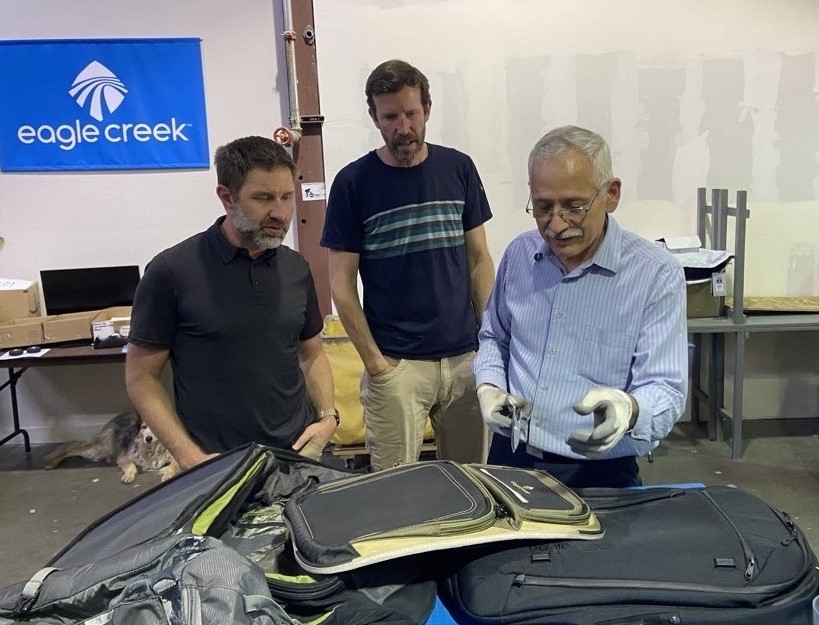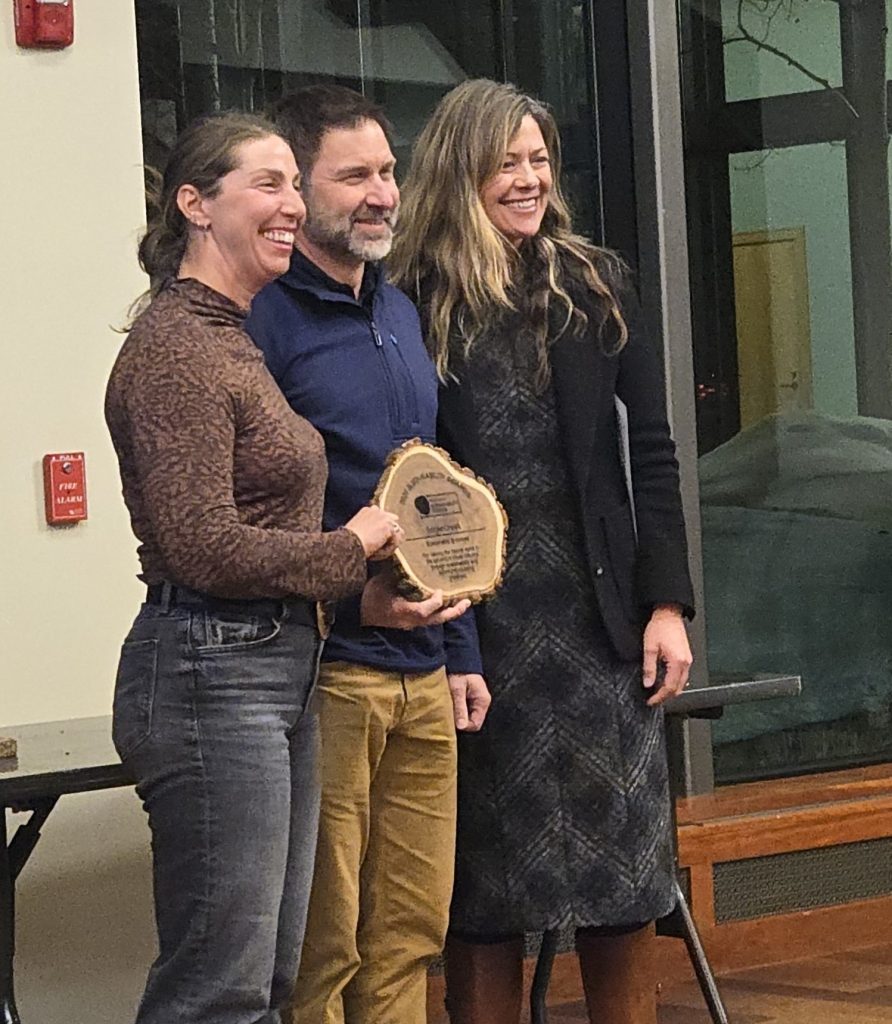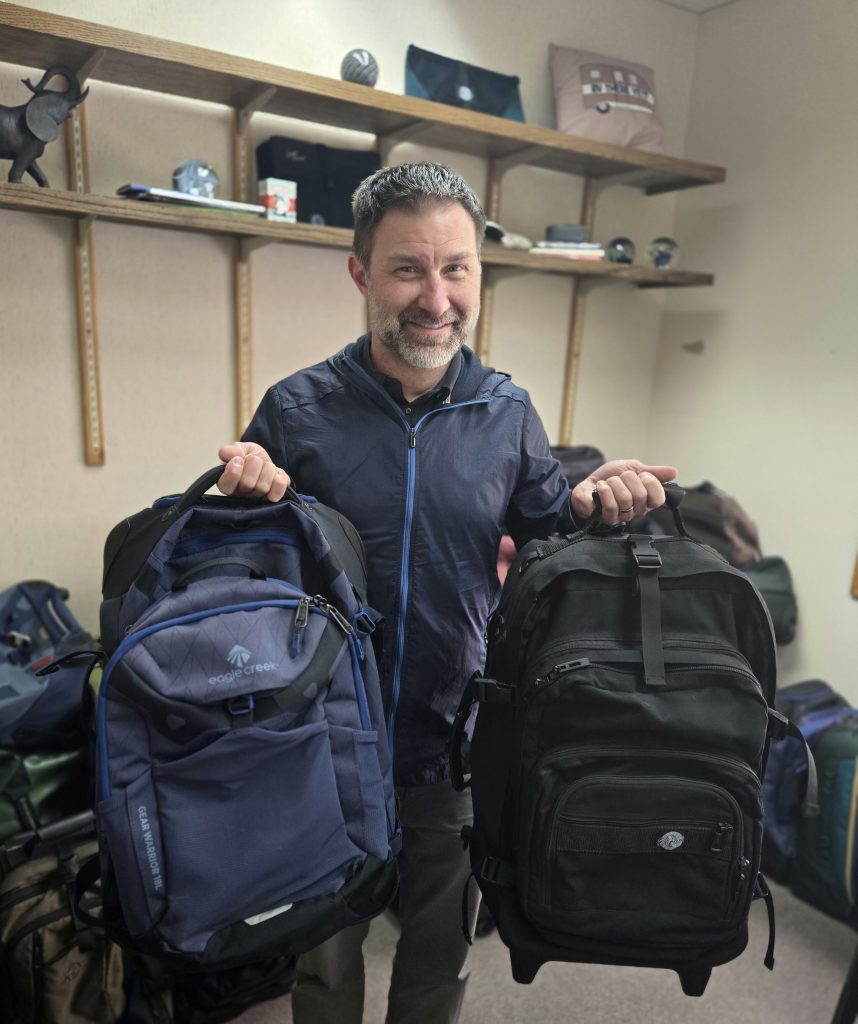Math calculations help Eagle Creek earn Sustainable Business award

Eagle Creek/Courtesy photo
One of the most important things the operations staff at Steamboat Springs-based Eagle Creek, an adventure travel gear business, can do to improve their company’s sustainability efforts comes down to math.
Vice President of Operations Jay Lambert maintains a detailed spreadsheet of calculations indicating how Eagle Creek products can be nestled inside larger suitcases and then combined to completely fill a shipping container.
Planning ahead to only ship products in full sea-cargo containers is one way Eagle Creek adventure travel gear works to reduce the environmental footprint of retail products made overseas. Although their products are made in Indonesia and Vietnam and are sold across the U.S., Canada, and Europe; along with Australia, New Zealand, Japan and Singapore, staff members are determined to reduce the carbon pollution footprint of operations as much as possible.
Those efforts were recognized with the company receiving the 2024 Sustainable Business of the Year award from the Yampa Valley Sustainability Council. During the nonprofit’s annual awards ceremony in January, the recognition highlighted Eagle Creek “for valuing the natural world in the adventure travel industry through sustainability and community building practices.”
“The Sustainable Business Award goes to those businesses that both define and advance sustainability through their ethos, products and process,” said YVSC Executive Director Michelle Stewart.
Lisa Bressler, Eagle Creek’s vice president of marketing and e-commerce, told the audience: “Sustainability is really something that we think about on a daily basis, we talk about and we really want to be always at the core of our business.”
The company, headquartered on the north end of Steamboat since September 2021, is pushing its sustainability agenda with plans to become “B Corp Certified” in two years, Bressler said. The certification is a gold standard for mission-driven, for-profit companies to meet high standards of social and environmental performance, transparency and accountability.

“We want to be able to accurately measure our carbon footprint and take the necessary actions to reduce along the supply chain where we can,” Bressler said. “Being in the retail industry is tricky. We are using materials and putting stuff out in the world in a landscape that is constantly changing.”
The three pillars of the company’s sustainability plan include longer life cycles, better materials and conscious environmental choices. In July the company met two big goals. Now 100% of Eagle Creek products are made with at least one recycled material such as post-industrial, post-consumer and ocean-recycled polyesters and nylons.
The company also eliminated all intentional use of PFAs, also known as forever chemicals, in their supply chain to help make their products safer for the planet.
“We are trying to take out negative materials and add in positive materials,” Bressler said. “So, what we like to say is we follow the science. We know the road ahead won’t be linear or simple. But we will make the best decisions that we can at the time that it’s presented to us, so really staying nimble and flexible to the extent that we can.”
Product designers for Eagle Creek strive to reduce material waste from the start. The company is moving forward to use reversible fabrics so that the cutting of pieces can be designed as tight as possible for the fabric rolls, Lambert said. That started with the efficiency redesign of the No Matter What duffel where the production waste level is now only 6% compared to 15% with the previous design.
Eagle Creek aims to reduce product waste despite the overall trend by consumers repeatedly throwing away inexpensive, non-durable products, so the company offers a lifetime “No Matter What” warranty. In 2024, the company repaired some 7,000 bags that had an average age of 12 years. The company also increased its repair locations from three to 10 to reduce the carbon footprint of shipping to warranty repair locations at stores that already sell and fix gear.
In the company’s small archive room, Lambert shows how Eagle Creek now offers at-home, do-it-yourself fixable options for commonly worn-out luggage pieces such as wheels. In the past, wheels were fixed with rivets, but the new bags have wheels affixed with Allen head screws so consumers can change out replacement parts at home.
Designs of luggage straps also are moving toward quick-release buckles that can be replaced at home without the need to cut and resew the strap.
Zippers are another top repair need, so Eagle Creek uses durable YKK brand zippers and is testing zippers made of recycled materials for the future.

The company produces some 60 products. Those include luggage, duffel bags, backpacks and packing cubes. The products also includes accessories and travel security items. For distribution from the company’s California warehouse, the team started this month a more efficient “containerization” process where computer labels show packers the box size to use that closely match the products.
Eagle Creek currently has 30 employees, including 15 working locally, 10 across the U.S. who work remotely and five in Europe. Employees also participate on multiple sustainability working groups through the Outdoor Industry Association.
“We take our responsibility to both the planet and our community seriously, so as more resourceful technologies, better-recycled materials and carbon-reducing business strategies emerge, you can bet we’ll be the first ones using them,” according to company materials.
Eagle Creek is part of a strong group of outdoor recreation companies based in the Yampa Valley, noted John Bristol, executive director at Routt County Economic Development Partnership.
“Beyond the Front Range, the Yampa Valley now boasts the highest concentration of outdoor gear brands in Colorado,” Bristol said. “This is significant because the owners, employees and values of these companies align with community values – support for public lands, sustainability and an outdoor lifestyle.”
To reach Suzie Romig, call 970-871-4205 or email sromig@SteamboatPilot.com.

Support Local Journalism

Support Local Journalism
Readers around Steamboat and Routt County make the Steamboat Pilot & Today’s work possible. Your financial contribution supports our efforts to deliver quality, locally relevant journalism.
Now more than ever, your support is critical to help us keep our community informed about the evolving coronavirus pandemic and the impact it is having locally. Every contribution, however large or small, will make a difference.
Each donation will be used exclusively for the development and creation of increased news coverage.










